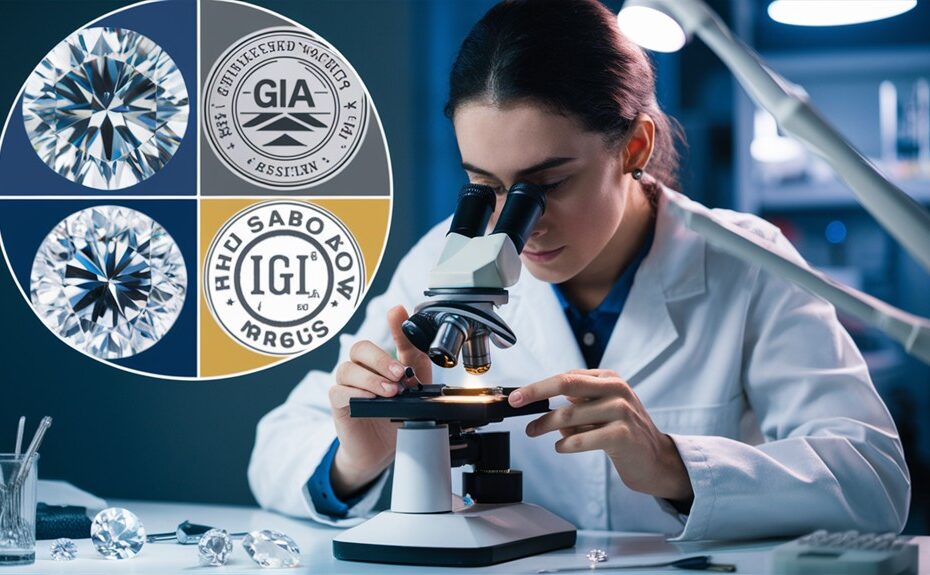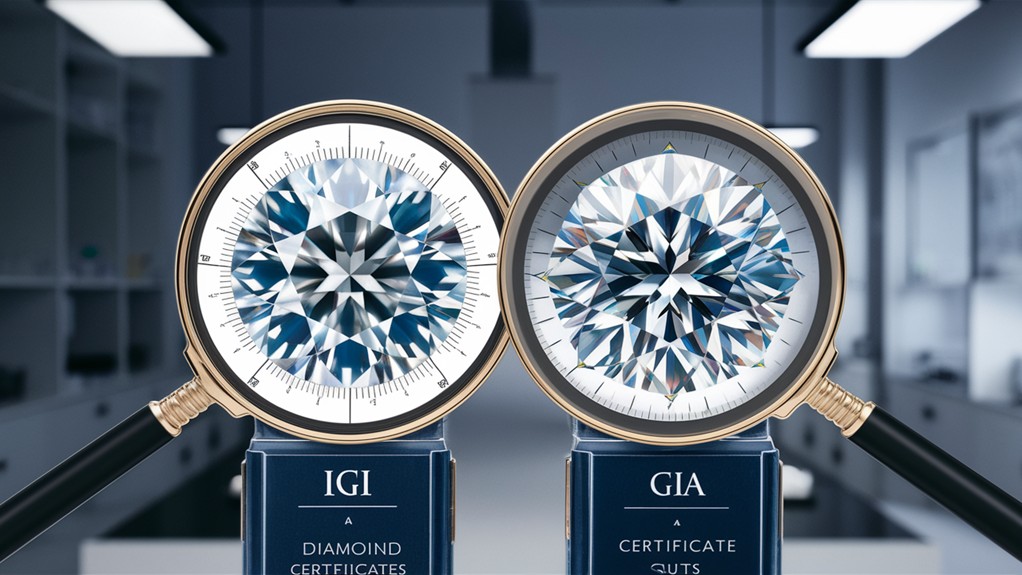When you're in the market for a diamond, you'll likely encounter two prominent certification bodies: GIA and IGI. These organizations play an essential role in determining a diamond's quality and value, but their approaches differ markedly. Understanding these differences can be the key to making an informed purchase decision and potentially saving thousands of dollars. Whether you're looking for an engagement ring or a statement piece, knowing how GIA and IGI grade diamonds will empower you to navigate the complex world of gemstone certification. But what exactly sets these two certifiers apart, and how does it impact your diamond's worth? Both GIA and IGI use the 4Cs – cut, clarity, color, and carat weight – to evaluate diamonds, but their grading standards and reputations vary. GIA is known for its strict grading standards and consistency, making their certifications highly sought after in the industry. On the other hand, IGI is often considered to be more lenient in its grading, potentially leading to slightly higher graded diamonds. Understanding the differences between these two certification bodies can help you make more informed decisions when purchasing diamonds or other types of garnet gemstones.
Our Highlighted Points
- GIA employs stricter grading standards, resulting in more conservative assessments and higher resale values for certified diamonds.
- IGI offers more lenient grading, faster turnaround times, and lower costs, appealing to budget-conscious consumers and fashion jewelry markets.
- GIA certification is generally 10-20% more expensive than IGI but is considered the industry gold standard.
- Both organizations use the 4Cs (Cut, Color, Clarity, Carat) for grading, but GIA's 5-point scale for cut quality is more detailed.
- GIA focuses on extensive research and educational programs, while IGI emphasizes practical training and workshops in diamond grading and jewelry design.
Origins of GIA and IGI
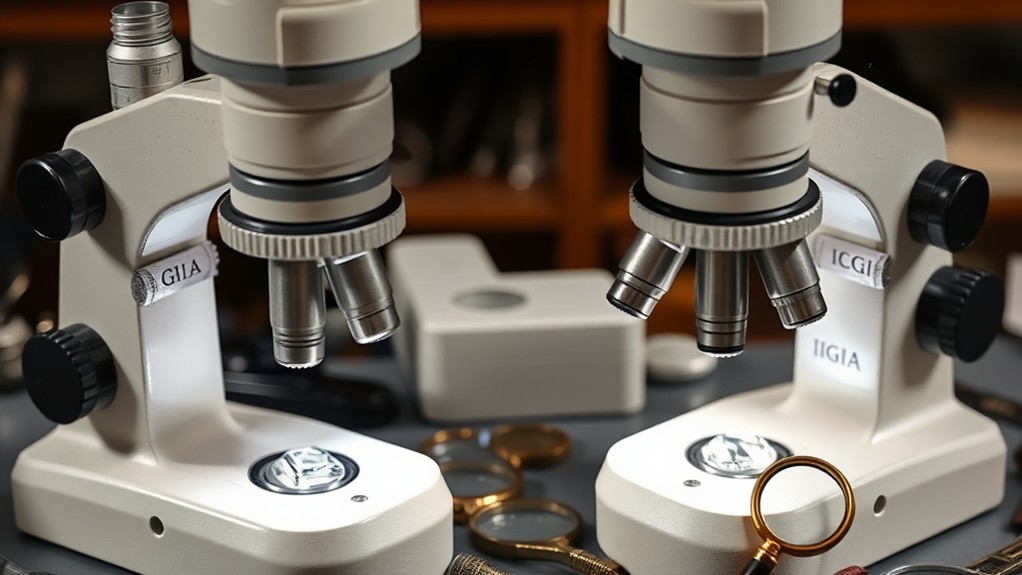
The diamond certification landscape is dominated by two major players: GIA and IGI. These reputable institutions have shaped the world of diamond grading and certification, each with its own unique history and approach.
GIA, or the Gemological Institute of America, was founded in 1931 in Carlsbad, California. It's widely recognized as the creator of the standardized 4Cs grading system for diamonds, which revolutionized the industry. As a non-profit organization, GIA focuses on unbiased grading and consumer protection, primarily operating in America and Western Europe.
In contrast, IGI, the International Gemological Institute, was established in 1975 in Antwerp, Belgium. It has since grown to become the largest independent gem lab globally, with a strong presence in Europe and Asia. IGI offers grading services at competitive prices, appealing to budget-conscious buyers.
Both organizations have expanded their services over time:
- GIA provides extensive educational programs in gemology.
- IGI offers gemology courses and workshops.
While their origins differ, both GIA and IGI have greatly contributed to establishing and maintaining high grading standards in the diamond industry, ensuring quality and consistency in the grading process.
Diamond Grading Fundamentals
Grounded in the 4Cs framework, diamond grading fundamentals form the backbone of both GIA and IGI's certification processes. When you're comparing GIA and IGI certifications, it's essential to understand how they approach the 4Cs: Cut, Color, Clarity, and Carat weight.
Here's a breakdown of the key differences:
| Criteria | GIA Certification | IGI Certification |
|---|---|---|
| Cut | 5-point scale | Detailed analysis |
| Color | Stricter standards | More lenient |
| Clarity | Rigorous grading | Less strict |
| Reports | Industry standard | Affordable |
GIA's diamond grading process is known for its stringent standards, particularly in color and clarity assessments. You'll find their cut quality graded on a scale from Excellent to Poor. In contrast, IGI's approach is generally more lenient, especially for smaller stones. While IGI provides detailed cut analyses, they may not use the same strict categorization as GIA.
Both organizations offer thorough grading reports with visual diagrams illustrating inclusions and blemishes. These reports improve transparency, allowing you to make informed decisions. While GIA's reports are often considered the gold standard because of their extensive research, IGI's certifications are valued for their accessibility and affordability.
Certification Processes Compared
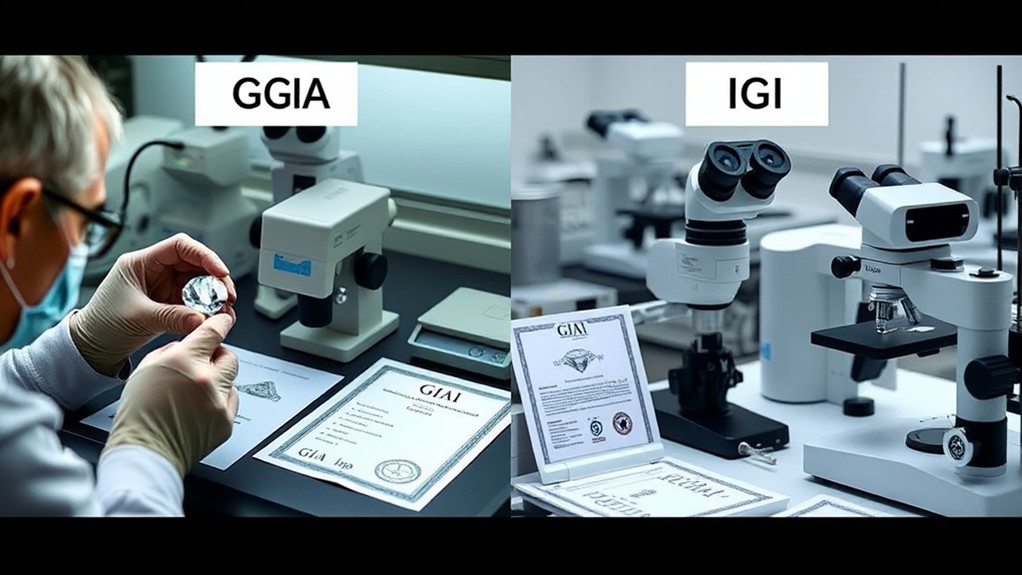
In relation to certification processes, GIA and IGI take distinct approaches that reflect their respective philosophies and market positions.
Both diamond grading institutions employ rigorous methods to guarantee objective assessment of certified diamonds, but their procedures differ in key aspects:
GIA Certification Process:
- Multiple expert gemologists evaluate each diamond
- Detailed visual inspection and gemological testing
- Stricter grading standards, especially for color and clarity
- Concise grading reports focusing on crucial information
IGI Certification Process:
- Anonymization and randomization of diamonds and gemologists
- Advanced technology for thorough evaluations
- Detailed grading reports with additional security features
- Faster turnaround times and lower costs
While both IGI and GIA certify diamonds using the 4Cs (cut, color, clarity, carat weight), GIA is recognized for its more stringent grading standards.
This often results in grading differences between the two institutions, with GIA typically providing more conservative assessments.
When choosing between IGI and GIA certification, consider your priorities:
- Budget and turnaround time: IGI may be more appealing
- Strictest grading standards: GIA is generally preferred
- Detailed reports with security features: IGI offers more thorough documentation
Ultimately, both institutions strive to provide reliable and accurate diamond certifications, catering to different market segments and consumer needs.
Reporting Styles and Formats
Moving from the certification processes to the actual reports, you'll find distinct differences in how GIA and IGI present their diamond grading information. GIA reports are known for their concise format, providing vital characteristics without excessive detail. In contrast, IGI reports tend to be more thorough, outlining additional features of the gemstone.
When examining GIA reports, you'll notice:
- A standardized template for all grading reports
- Plotted diagrams illustrating inclusions and blemishes
- Crucial information about the diamond's characteristics
IGI reports, conversely, offer:
- Varied formats depending on the specific type of grading
- More extensive documentation of the diamond's attributes
- Diagrams similar to GIA's, but with potentially more detail
Both GIA and IGI utilize:
- Unique internal tracking numbers for authenticity and traceability
- Electronic reporting systems for online verification
These differences in reporting styles allow you to choose the certification that best suits your needs. GIA's concise approach provides quick, vital information, while IGI's detailed reports offer a more thorough overview of your diamond's characteristics.
Regardless of your choice, both organizations prioritize transparency and trust in the grading process.
Market Perception and Reputation
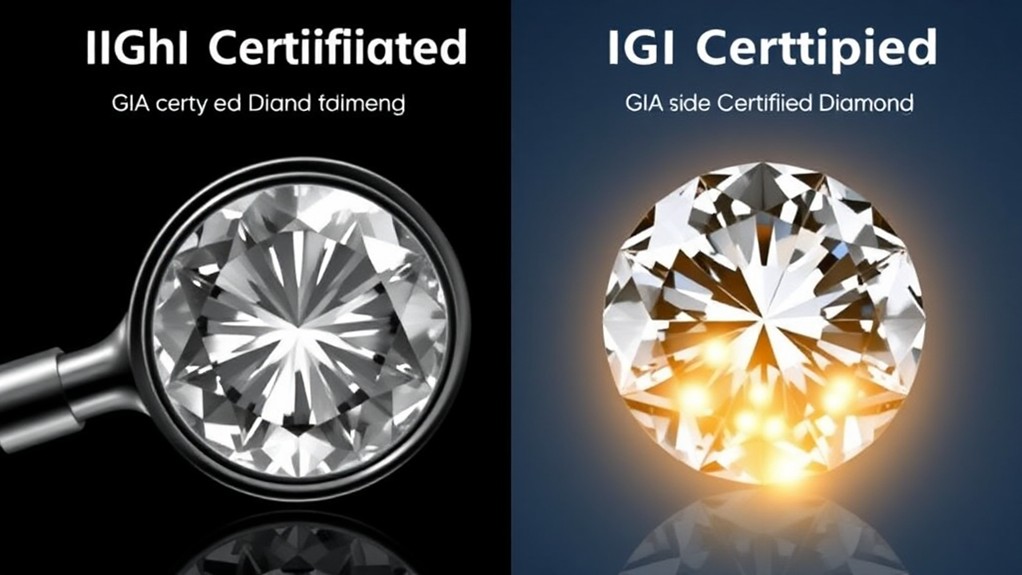
Diving into market perception and reputation, you'll find a clear distinction between GIA and IGI certifications. GIA, established in 1931, is widely regarded as the gold standard in diamond grading, particularly in the United States and Western Europe. Its rigorous grading standards and long-standing history have solidified its position as the most reputable certification organization.
IGI, conversely, has gained considerable traction in Europe and Asia, known for its more lenient grading standards. While this appeals to budget-conscious consumers, it's essential to recognize that diamonds with GIA certifications typically command higher resale values, reflecting greater consumer confidence.
| Aspect | GIA | IGI |
|---|---|---|
| Reputation | Gold standard | Well-accepted in trade |
| Grading Standards | Strict | More lenient |
| Market Strength | US & Western Europe | Europe & Asia |
When considering certification options, you'll find that GIA is often preferred for high-value investments because of its transparent and stringent grading methodologies. However, IGI has carved out a considerable niche in the lab-grown diamond market, where its certifications are widely accepted. Your choice between GIA and IGI certification can greatly influence your purchasing decision, depending on your priorities and budget constraints.
Pricing and Value Considerations
In relation to pricing and value considerations, GIA and IGI certifications play a crucial role in determining a diamond's market worth.
When comparing GIA certification to IGI certification, you'll notice a significant price difference, often ranging from 10-20% or more. This disparity is primarily because of GIA's stringent grading standards and stellar reputation in the diamond market.
If you're considering a high-value investment, GIA-certified diamonds generally offer better resale values. Their strict quality assurance protocols and well-regarded reports make them more attractive to insightful buyers.
However, if you're a budget-conscious consumer, IGI certification might be more suitable for your needs. IGI offers more affordable diamonds with lower grading fees and faster turnaround times, making them ideal for fashion pieces or less expensive jewelry.
When making your decision, consider the following factors:
- Intended use of the diamond (investment vs. fashion)
- Your budget constraints
- Potential resale value
- Level of quality assurance required
Educational Offerings and Research
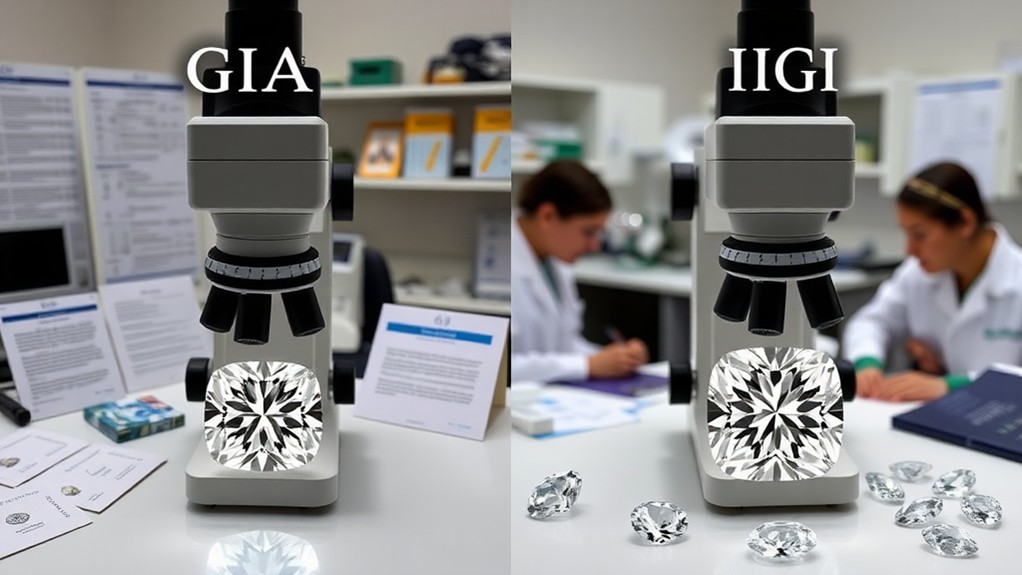
Both GIA and IGI offer educational programs and conduct research, but their approaches and focus areas differ markedly.
GIA's educational offerings are widely recognized as the gold standard in the gemology industry, with their Graduate Gemologist (GG) diploma being particularly prestigious. If you're pursuing a career in gemology or seeking thorough knowledge of diamonds, GIA's programs are often considered crucial.
IGI, conversely, places a strong emphasis on practical training and workshops. Their courses focus on diamond grading, jewelry design, and colored gemstones, catering to both professionals and enthusiasts. If you're looking for hands-on experience in gemology, IGI's approach may be more suitable.
In terms of research, GIA conducts extensive gemological studies to improve grading processes and develop new methodologies. This research contributes to the continuous advancement of their educational programs and grading standards.
While IGI similarly engages in research, their primary focus remains on practical training and certification services.
When choosing between GIA and IGI for educational purposes, consider:
- Your career goals
- The level of depth you require
- The balance between theoretical knowledge and practical skills
- Industry recognition of the certification
Choosing Between GIA and IGI
When choosing between GIA and IGI certification for your diamond, you'll need to contemplate several factors. Consider your intended use for the diamond and your budget constraints. GIA certification is widely recognized for its strict grading standards, making it the preferred choice for high-value investment pieces. Conversely, IGI offers more affordable certification options, appealing to budget-conscious buyers and retailers.
| Factor | GIA | IGI |
|---|---|---|
| Grading Standards | Stricter | Less strict |
| Resale Value | Higher | Lower |
| Turnaround Time | Longer | Faster |
| Cost | Higher | Lower |
For investment-grade diamonds, GIA's rigorous grading process and long-standing reputation typically command higher resale values. However, if you're looking for fashion jewelry or less expensive items, IGI certification may be suitable. IGI likewise provides faster grading report turnaround times, which can be beneficial if you're in a hurry.
When it comes to lab-grown diamonds, both organizations use similar grading criteria. However, IGI is often preferred in this market for its clear grading standards and cost-effective processes. Ultimately, your choice between GIA and IGI certification should align with your specific needs and priorities.
Frequently Asked Questions
What Is the Difference Between GIA and IGI Grading?
You'll find GIA's grading is stricter, especially for clarity and color. IGI's more lenient approach often results in higher grades. GIA's process is more rigorous, involving multiple experts, while IGI anonymizes diamonds during assessment for unbiased grading.
Why Is IGI so Much Cheaper Than GIA?
You'll find IGI certification cheaper because of its more lenient standards and faster processing. They've streamlined operations to serve a broader market, focusing on affordability. Unlike GIA's rigorous process, IGI's efficiency allows them to maintain lower prices without sacrificing basic quality.
Is IGI or GIA Better for Lab Diamonds?
For lab diamonds, IGI is generally considered better. You'll find IGI's certification process more tailored to lab-grown gems, with quicker turnaround times and clearer grading standards. They're additionally more widely accepted in the lab diamond industry.
Is IGI Grading Accurate?
IGI's grading is generally accurate, though it's often seen as more lenient than GIA. You'll find their process is rigorous, employing advanced technology and multiple checks. They're ISO 17025 certified, which adds to their credibility in diamond grading. Additionally, IGI’s standards for grading colored diamonds are considered to be more stringent than those of GIA. In the world of coin grading comparison, IGI is also recognized for its thorough and reliable evaluations, making their services highly sought after by collectors and investors alike. Overall, IGI’s expertise and reputation in gem and coin grading make them a trusted authority in the industry.
